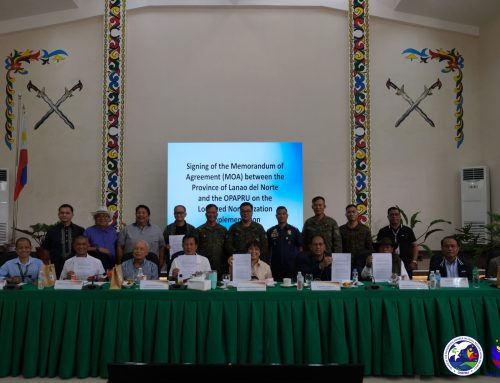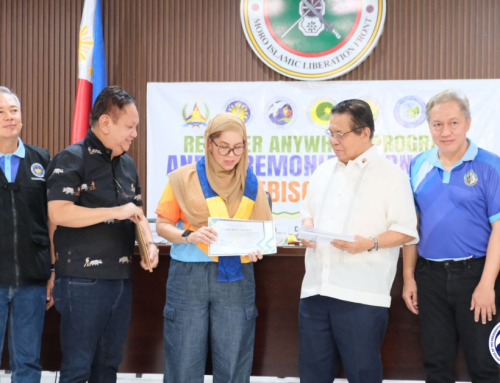Datu Saudi Ampatuan, Maguindanao (16 October 2020) — The heavy downpour the night before made the already rugged terrain in this highland village even more challenging to traverse. After more than half an hour of carefully navigating the cliff lining the rain-soaked mountain range, the team finally reached Sitio Bagong, Barangay Kabingi, home of the Tedurays, the highland tribe of Maguindanao.
For the Joint Task Forces on Camps Transformation (JTFCT), led by its co-chairs Member of the Parliament Engr. Baintain A. Ampatuan and Office of the Presidential Adviser on the Peace Process (OPAPP) Director Cesar D. De Mesa, the visit to this far-flung Indigenous Peoples (IPs) community is part of the JTFCT’s mission of conducting consultations in areas within government-acknowledged Moro Islamic Liberation Front (MILF) camps.
For members of the Teduray tribe, however, the unpaved, muddy terrain of their community has constrained them from realizing their land’s full agricultural potential. For instance, the lack of farm-to-market roads has made it difficult for them to transport produce from farming areas to markets. This is a concern which the camps transformation component of the normalization process under the Comprehensive Agreement on the Bangsamoro (CAB) hopes to address.
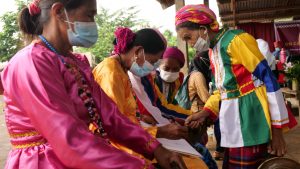
“Mag-isa ko na lang tinataguyod ang tatlo kong anak ngayon, kaya hiling ko lang po na magkaroon po kami ng mas magandang kabuhayan na mga katutubo para po sa aming mga anak at mga apo at makabalik na po kami sa mga lugar namin na naapektuhan ng kaguluhan noon. Sana po matupad po ang mga hiling namin dito sa development sa camps transformation,” said Neda Daengan Mabilis, a Teduray.
Neda and other members and tribal leaders of IP communities situated within MILF Camps Omar and Badre were among the participants of the IP consultations on Camps Transformation conducted by the JTFCT here in this hinterland municipality and at Upi, Maguindanao from October 14 to 15, 2020, respectively.
Inclusive development: No one left behind in the Bangsamoro
After traversing the highlands of Datu Saudi Ampatuan, the JTFCT delegation along with co-chair and member of the Government of the Philippines Peace Implementing Panel (GPH-PIP) David Diciano braved heavy rainfall to meet with the tribal leaders of North and South Upi in Maguindanao to hear their sentiments and gather suggestions on how to spur development in their communities.
Welcoming the members of the task force was Upi Mayor Ramon Piang who was once a member of then-GPH Peace Negotiating panel in 2010-2012 representing the IPs, and a Teduray timuay (chieftain) himself. “There is nothing impossible as long as we sit and talk. Let us understand each other’s role for the peace agreements to move forward,” Piang declared.
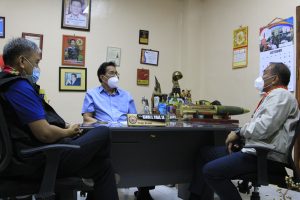
A composite team which includes members of the JTFCT, MILF, OPAPP, Bangsamoro Planning and Development Authority (BPDA), and Bangsamoro Development Authority (BDA) is currently crafting Camps Transformation Plans (CTPs) for MILF Camps Badre, Omar ibn al-Khattab and Abubakar as-Siddique in Maguindanao; Camps Bilal and Busrah Somiorang in Lanao; and Camp Rajamuda in Maguindanao and North Cotabato.
The CTPs includes socioeconomic programs that are considered as embodiment of the hopes and aspirations of every Bangsamoro, and are expected to transform their camps into productive, peaceful, civilian and sustainable communities.
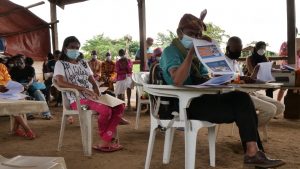
The inputs gathered during the consultation forums will be integrated into the CTPs. The plans, which cover a six-year implementation phase, are set to be completed and turned over within the last quarter of this year.
During the forums, Ampatuan assured members of the IP community that their rights shall be recognized under the Bangsamoro Organic Law (BOL).
“Hindi pinapabayaan ang welfare ng IPs, bagkus ay pinalakas ito ng BOL. Kayo ay maswerte because of the BOL. It is provided in the BOL that there should be an IP code,” she said.
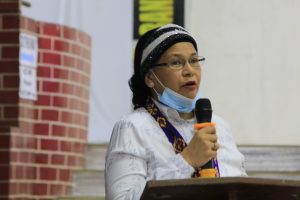
“The only objective of transforming these camps is to make [them] as productive as possible. Mas mayaman tayo kaysa [karatig bansa] pero hindi natin alam paano gamitin ang ating kayamanan,” she added.
For his part, Diciano emphasized that the programs and projects to be implemented under the CTPs shall benefit everyone in the community, regardless of tribe, religion or ideology.
“This is for everyone, informed by everyone. In the peace process, we have learned that programs are only sustained if we have social cohesion and a sense of ownership. Ang ating mga programa sa MILF camps ay para sa lahat, Moro man, Kristiyano o Lumad,” Diciano said.
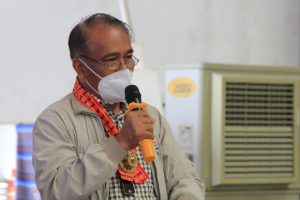
Member of Parliament Romeo Saliga, who represents the IP sector in the Bangsamoro Transition Authority (BTA), stressed the importance of addressing the needs of the country’s IPs in order for genuine development to take root in the region.
The visits of the JTFCT to the IP communities coincided with this year’s celebration of National Indigenous Peoples Month which highlights the rich culture and traditions of the country’s IPs. The year’s theme is “IPRA @ 23: Correcting Historical Injustices.”
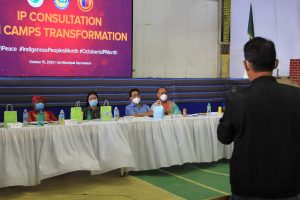
“‘Yung mga katutubo ay dapat mabigyan ng pagkilala dahil wala pa ang mga kampo, wala pa ang kasalukuyang sistema ng bansa, ang mga katutubo ay andyan na. Maraming probisyon ng BOL ang nakatuon sa normalisasyon, at ang usapin ng mga katutubo, kapag hindi madala sa usaping pangkapayapaan, ay magfe-fail ang peace process,” Saliga said.
Representing BPDA director-general was Engr. Mohajirin Ali, Engr. Mohammad Hadafie Abubakar, who assured the IPs that the Bangsamoro government “will protect the IP’s rich culture and heritage, and ensure that BARMM policies will not discriminate against their traditions.”
TJR: Towards healing and reconciliation
The JTFCT consultations also became a gathering for former adversaries who are now working together to bring genuine peace and development in the Bangsamoro. The rifles they once carried have now been replaced by folders full of project proposals and development plans.
De Mesa, a retired brigadier general of the Armed Forces of the Philippines (AFP) and now director of the PAyapa at MAsaganang PamayaNAn (PAMANA) National Program Management Department (NPMD), sat side by side with Kashmir Mohamad, base commander of the MILF’s 104th base command, who now acts as the JTFCT’s camp coordinator for Camp Badre.
De Mesa and Mohamad recalled how they once stood on opposite sides of the battlefield, as they strategized on their next offensives. But after the signing of the CAB, the wounds of the past have started to heal, as both sides have realized that decades of armed conflict cannot be resolved through armed force but through peaceful dialogue.
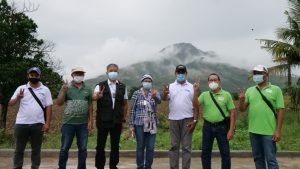
“Tapos na ang panahon ng bakbakan, daanin na natin sa peace process, sa peace and development. Kung meron man tayong mga pinagdaanan noon, ngayon wala na ‘yun. Bigyan natin ng chance ang peace. Ang peace at development ay magkatuwang,” said De Mesa.
Transitional justice and reconciliation (TJR) is among the major components of the normalization track. TJR aims to address the legitimate grievances of the Bangsamoro people, as well as the Moro and non-Moro IPs and settlers, through healing, mutual understanding and reconciliation.
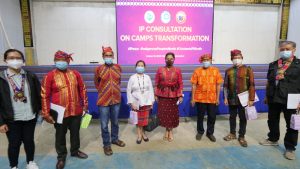
Present during the IP consultation at Datu Saudi Ampatuan were Timuays Lorhi Met, Ronald Anawan, Fintailan Jocelyn Fantingan, Rody Biansilan, Victor Sangkupan, Afo Minggil, Alex Ulama, Sammy Daya, Ernesto Sangkupan, Zaldie Lalie, and Noel Ented. Attending the consultation at Upi were Timuays Rene Batitao, Letecio Datuwata, Hon. Beatriz Yap, and Mr. Andic Balala.
OPAPP was also represented by Dir. Farrah Grace Naparan; Engr. Casana Mandal, JTFCT focal person; Wenielou Escala, TJRU technical staff; and Ryan Dave Jungco, chief operations officer of the combined secretariat for GPH CCCH and GPH AHJAG.
Also present were IP representatives Sheryl Leah Batitao and Timuay Santos Unsad, representing Minister of Indigenous Peoples Affairs (MIPA) BARMM; and Timuay Jovel Tenorio, IP mandatory representative of Datu Saudi Ampatuan.
The security sector was represented by Lt. Col. Charlie C Banaag Inf (GSC), commanding officer, 6th IB; Col. Ferdinand Lacadin, deputy brigade commander of the 1st Mechanized Brigade; Lt. Col. Dante Gania, executive officer of 603rd Bde; and Lt. Col. Philam Jay Balaqui, chief of police of the municipal police station of North Upi.
Other JTFCT personnel present were Timuay Alim Bandara, GPH JTFCT camp coordinator for Camp Badre; and Froilyn Mendoza, GPH JTFCT camp coordinator for Camp Omar. ###



